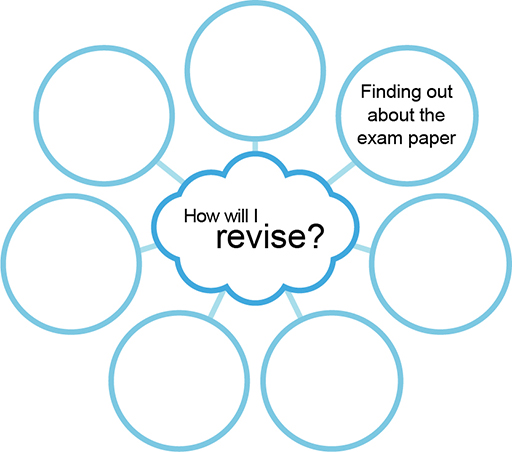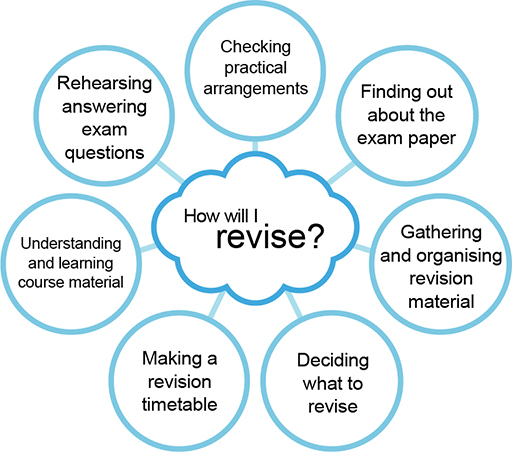3 Revision
Revision is not, as the word suggests, simply ‘looking again’ at the material covered in a course - it is a more active task. It involves organising material and finding ways of remembering it, that suit your own particular learning style. Although the time you set aside for revision is important, the approach you adopt and the techniques you use to revise are more vital. Sometimes the thought of having to revise can seem daunting, but be reassured, revision skills and techniques can be learned and practised.
Find a place to revise:
Other than the obvious suggestions of having a warm, well-lit and comfortable place to work, we also suggest that you think about choosing a revision place where you can spread out your materials and leave them as they are, without having to pack anything away. This means that you can pick up and put down your revision whenever you find time to revise. This will help you to make the most of your revision time.
On the other hand, you may find that you concentrate better away from the distractions of home. If so, try using the private study facilities at your local library.
Identify the stages of revision:
Although you will eventually develop your own particular approach to revision, it is valuable to reflect a little on the stages you might go through in preparing for your next exam. To do this, we suggest that you adopt a technique called mind-mapping.
Mind-mapping can be used to collect and organise ideas at any time during your studies. Some people have the kind of memory that uses visual cues very effectively, and mind-mapping taps into this memory style. It enables you to lay out your thoughts on a particular topic in a structured way, and to use the way remembered ideas lead on to other associated ideas.
Activity 2
- Think about how you plan to approach your revision. Then try mind-mapping your ideas, using the ‘map’ outline in Figure 1 Blank revision mind-map.
- Once you have completed your mind-map, compare it to the completed version included in the discussion below. As you can see, the topic for the mind-map - How will I revise? - is in the centre. The nice thing about mind-maps is that the organisation of your thoughts can come later. So go ahead, just think about the whole process of revision and put your thoughts into the blank boxes. To start you off, we have included a suggestion in the top right box. Once you have done this, decide whether there is any order or link between the activities you have recorded.
This image shows a blank mind-map made up of a central box surrounded by seven further boxes. Each of the surrounding boxes are linked to the central box by a line. The central box contains the words ‘How will I revise?’. A box to the top right contains the words ‘Finding out about the exam paper’. The other boxes are blank.
Figure 2 shows our suggestion for a ‘Revision mind-map’. The numbers in each box show suggested stages in the revision process. Our map may not look identical to yours, but we imagine that we have identified similar activities.
Over the next few pages, we will look at each of the stages of revision identified by the mind-map in greater detail. These are listed below.
- Stage 1: Finding out about the exam paper
- Stage 2: Gathering and organising revision materials
- Stage 3: Deciding what to revise
- Stage 4: Making a revision timetable
- Stage 5: Understanding and learning the course material
- Stage 6: Rehearsing answering exam questions
- Stage 7: Checking practical arrangements
The advice contained in this course is relevant to all subjects, but the main emphasis is on the written word and, in particular, the exam essay format. Later in the course, we have included some specific information about revising for maths, science, technology and modern languages.


